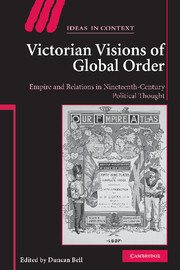 Victorian Visions of Global Order
Victorian Visions of Global Order Published online by Cambridge University Press: 22 September 2009
INTRODUCTION
As should be obvious from other chapters published in this volume, there was a near-consensus among Victorian political thinkers that not all nations or states were equal members of an international community. Rather, a distinction was made, quite explicitly and routinely, between ‘civilised’ European and Christian nations, to which the rules of international law or international morality applied, and ‘barbarians’, who could not claim the same treatment. In this chapter I focus on another distinction about which there was a near-consensus, at least for most of the Victorian period, a distinction that applied to nations within the so-called ‘civilised’ world: that between ‘great’ and ‘small’ nations.
From at least the middle of the nineteenth century, once the revolutions of 1848 had brought the issue of ‘nationality’ to the foreground of European politics and political thinking, through to the 1920s, when, in the aftermath of the treaties that followed the end of the First World War the new international settlement was being vividly debated, one of the issues that attracted considerable attention on the part of political thinkers was that of the scale or size of nations.
To save this book to your Kindle, first ensure no-reply@cambridge.org is added to your Approved Personal Document E-mail List under your Personal Document Settings on the Manage Your Content and Devices page of your Amazon account. Then enter the ‘name’ part of your Kindle email address below. Find out more about saving to your Kindle.
Note you can select to save to either the @free.kindle.com or @kindle.com variations. ‘@free.kindle.com’ emails are free but can only be saved to your device when it is connected to wi-fi. ‘@kindle.com’ emails can be delivered even when you are not connected to wi-fi, but note that service fees apply.
Find out more about the Kindle Personal Document Service.
To save content items to your account, please confirm that you agree to abide by our usage policies. If this is the first time you use this feature, you will be asked to authorise Cambridge Core to connect with your account. Find out more about saving content to Dropbox.
To save content items to your account, please confirm that you agree to abide by our usage policies. If this is the first time you use this feature, you will be asked to authorise Cambridge Core to connect with your account. Find out more about saving content to Google Drive.